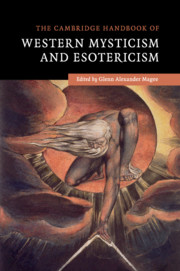Book contents
- Frontmatter
- Dedication
- Contents
- Acknowledgments
- Editor's Introduction
- List of contributors
- I ANTIQUITY
- II THE MIDDLE AGES
- III THE RENAISSANCE AND EARLY MODERNITY
- 12 Renaissance Hermetism
- 13 Christian Kabbalah
- 14 Paracelsianism
- 15 Rosicrucianism
- 16 Jacob Boehme and Christian Theosophy
- 17 Freemasonry
- 18 Swedenborg and Swedenborgianism
- 19 Mesmer and Animal Magnetism
- IV THE NINETEENTH CENTURY AND BEYOND
- V COMMON THREADS
- Suggestions for Further Reading
- Index
- References
16 - Jacob Boehme and Christian Theosophy
from III - THE RENAISSANCE AND EARLY MODERNITY
Published online by Cambridge University Press: 05 May 2016
- Frontmatter
- Dedication
- Contents
- Acknowledgments
- Editor's Introduction
- List of contributors
- I ANTIQUITY
- II THE MIDDLE AGES
- III THE RENAISSANCE AND EARLY MODERNITY
- 12 Renaissance Hermetism
- 13 Christian Kabbalah
- 14 Paracelsianism
- 15 Rosicrucianism
- 16 Jacob Boehme and Christian Theosophy
- 17 Freemasonry
- 18 Swedenborg and Swedenborgianism
- 19 Mesmer and Animal Magnetism
- IV THE NINETEENTH CENTURY AND BEYOND
- V COMMON THREADS
- Suggestions for Further Reading
- Index
- References
Summary
Introduction
The term “theosophy” literally means “wisdom of God.” This can be interpreted either as “God's wisdom” or as “wisdom about God.” As we shall see, this ambiguity is actually crucial to understanding theosophy. Not only are both interpretations correct, in the end – at least in the Christian theosophy of Jacob Boehme – they come to mean the same thing.
The first person to use the term “theosophy” seems to have been Porphyry (ca. 234–ca. 305), and since then the word has been used by many authors in many ways, positively and pejoratively. It is now most famously associated with the Theosophical Society of Madame Blavatsky (1831–1891). However, “Christian theosophy” is something quite distinct from Blavatsky's movement.
Christian theosophy is an early modern, Protestant German mystical movement. It can be seen as a precursor to both German Romanticism and German philosophy, especially Idealism. Indeed, Hegel himself said of Boehme that he was “the first German philosopher; the content of his philosophizing is genuinely German [echt deutsch].” The main Christian theosophers are all German, though the movement had a significant influence in England and France.
There is general agreement among scholars as to the intellectual streams that coalesce to form theosophy: medieval German mysticism, alchemy, Paracelsism, and Kabbalism. Of the authors who are recognizably theosophical, some of the early figures include Valentin Weigel (1533–1588), Heinrich Khunrath (1560–1605), and Johann Arndt (1555–1621). The supreme exemplar of the tradition, however, is the famed cobbler of Görlitz, the philosophicus teutonicus, Jacob Boehme (1575–1624). Indeed, the Christian theosophical tradition may, for all intents and purposes, be considered the Boehmean tradition, and it is Boehme and his thought that are the focus of this essay.
In the year 1600, Boehme had an experience of mystical gnosis. Gazing at a gleam of light reflected in a pewter vessel, he was suddenly opened to an immediate experience of the Being of all beings. He remained silent for twelve years, then began writing the work that would come to be known as Aurora, oder Morgenröte im Aufgang. Boehme intended this only as a personal exercise, but he showed the work to friends who then circulated it.
- Type
- Chapter
- Information
- The Cambridge Handbook of Western Mysticism and Esotericism , pp. 184 - 199Publisher: Cambridge University PressPrint publication year: 2016



